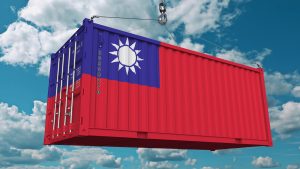Taiwan has applied to join the Comprehensive and Progressive Agreement for Trans-Pacific Partnership (CPTPP), less than a week after China formally announced its own bid for membership.
Deputy Minister of Economic Affairs Chen Chern-chyi made the announcement on Wednesday; a press conference with additional details is expected to follow on Thursday
“Applying to join the CPTPP is an important economic and trade policy that the government has worked hard to promote for a long time,” Cabinet spokesperson Lo Ping-cheng said in a separate statement.
In many ways, Taiwan is a far more natural fit than China for the CPTPP, which is touted for its high standards on issues like labor protection, environmental issues, and state subsidies. Taiwan ranked sixth in the world in the Heritage Foundation’s 2021 Index of Economic Freedom; China was 107th. (The current CPTPP members’ placing on the index ranges from first-ranked Singapore to 90th-ranked Vietnam, with an average ranking of 31.)
Taiwan’s economic minister, Wang Mei-hua, made that point just after China’s bid. “We could question if China meets the CPTPP’s high standards for inclusion right now,” she said. “Recently, China has repeatedly interfered with the economy in highly illiberal ways, heightened surveillance, reduced transparency and even banned imports without proper cause.” Taiwan itself has frequently been a target of such bans, which are seen as politically motivated.
Taiwan has expressed interest in joining the CPTPP since before the deal was even finalized, back in the days when it was just the Trans-Pacific Partnership (TPP) and the United States was its leading proponent. Now, the U.S. is on the outside looking in, after the Trump administration withdrew the country from the bloc. That will make it more difficult for Taiwan to join, as it won’t have its most stalwart and influential international supporter inside the CPTPP, pushing for its inclusion. Pressure from China against Taiwan’s bid, meanwhile, is sure to be intense.
Undaunted, Taiwan has already been “negotiating unofficially with the CPTPP’s member countries,” according to Taiwan’s Central New Agency. Wang had previously told CNA that Taiwan has already reviewed its laws, “some of which will be amended in line with the requirements under the deal.”
“Our strategy is to line up allies in a low-key manner and work on building consensus before pursuing any official application,” Wang had said in a press conference on September 17. “That way, things tend to happen smoothly as a matter of course.”
From a pure trade perspective, the inclusion of Taiwan – free market, developed economy in the Pacific – in the CPTPP seems like a no-brainer. But as is always the case for Taipei, its limited international status – and Chinese opposition to any expansion of that status – will be the key barrier, rather than any economic legislation.
China has opposed every move to increase Taiwan’s international space, from bilateral engagements to participation at the World Health Organization, by warning counterparts to “stop sending wrong signals to the ‘Taiwan independence’ separatist forces to avoid damaging … peace and stability across the Taiwan Strait.” As of this writing, Beijing had not issued an official response to Taiwan’s CPTPP bid but we can expect a similar refrain when it does.
There are possible models for Taiwan to join the CPTPP. Taiwan – under the moniker of “Chinese Taipei” – is a member of the Asia-Pacific Economic Cooperation (APEC) grouping, alongside China. That inclusion is possible because APEC describes itself as a group of “member economies” rather than “member states” (Hong Kong is also a member of APEC). China flatly refuses to countenance Taiwan’s participation in any organization that requires statehood to join.
Taiwan is also in the WTO as a “separate customs territory,” the same status accorded to Hong Kong and Macau. The WTO example is potentially illuminating in light of China and Taiwan’s separate bids for CPTPP membership. Taiwanese diplomats involved in the process say that, economically, Taiwan was ready to join the WTO far before China was, but Beijing refused to allow Taipei to precede it as a WTO member. So Taiwan had to wait until China completed lengthy negotiations on economic reforms. Taiwan’s WTO membership bid was officially approved the day after China was given the same greenlight.
With that precedent in mind, even in a best case scenario – where China doesn’t move to block Taiwan’s participation outright – it’s likely that Beijing would insist upon joining the CPTPP before Taipei. That would frustrate Taiwan, as China’s reform process to meet CPTPP requirements will be much longer (if, indeed, it is willing to undertake the necessary changes). But there’s also a sliver of opportunity there, should the existing CPTPP members make a near-simultaneous acceptance of Taiwan’s bid a necessary condition of China’s own CPTPP membership.
The big question is whether China would agree to allow Taiwan in under any circumstances, given its aggressive stance toward the Tsai administration. If, as some commentators have suggested, China’s bid for CPTPP membership is mostly symbolic and there is no real intent to join, then Beijing would have double the incentive to block Taiwan from acceding to the group.
Even if China decides not to oppose Taiwan’s bid, it’s an open question as to whether Taiwan would agree to join CPTPP under a name like “Chinese Taipei,” the name it has adopted in the past to gain access to international organizations. In recent years, that name has sparked controversy as an embarrassing obfuscation of Taiwan’s status as a de facto independent country. There’s a strong domestic movement to rebrand Taiwan’s overseas engagements – whether its Olympic team or its representative offices overseas – to include the word “Taiwan.” Given that context, joining a new agreement under a purposefully obscure name simply to please China might not pass political muster in Taiwan.
In addition to its CPTPP bid, meanwhile, Taiwan is also pressing for bilateral free trade agreements with the United States and European Union.

































